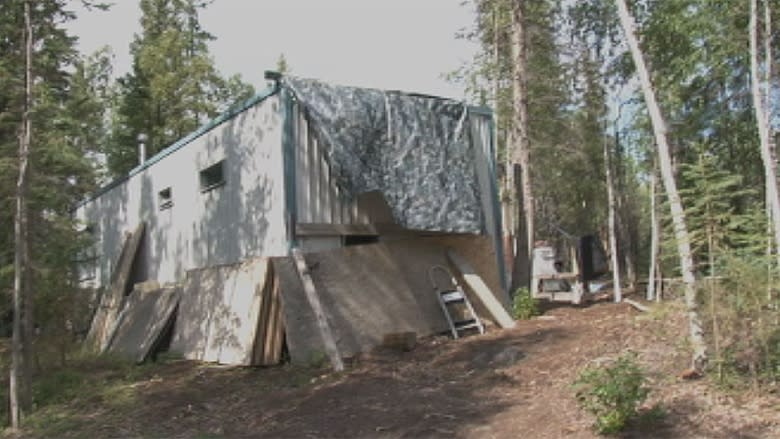Changes to N.W.T. lands acts could be bad news for squatters
The territorial government is reviewing the Commissioner's Land Act and the N.W.T. Lands Act.
It is gauging public opinion on changes to modernize the two acts and make them more efficient, through a series of public meetings across the N.W.T.
For participants in Yellowknife, the message was clear: crack down on squatters.
A handful of people attended a meeting in Yellowknife last week. Some said they want to see the government crack down on people who set up cabins without a lease.
"It's been a real travesty of justice," said one resident who did not want to be named. He was frustrated by what he said was the tendency for squatters to eventually get a lease for land they had been occupying illegally.
"It makes me want to go out and break the law."
Backcountry build-ups
Out in the bush beyond Yellowknife — as well as on small islands along the shoreline stretching out to Great Slave Lake — is peppered with everything from small, obviously temporary, tent encampments, to stick-framed cabins the scale and permanency of a fine country home.
Sometimes a canvas-walled tent slowly morphs over the years into a relatively permanent wood-framed structure.
One thing not obvious from looking at a structure is whether or not it is on leased land or not. There's a certain leniency for non-permanent structures set up in the bush, but when it comes to a permanent structure, if it's not authorized to be there it may technically be a squatters encampment, with exceptions for Indigenous traditional use.
Dave Jones, a resident of Yellowknife, said he's been filing complaints against squatters for at least 10 years, but has never seen any action.
"So somebody goes up and sets up a tent-frame, and then it becomes a cabin, and then it becomes a building, and you tell me that they don't need tenure?" Jones asked representatives from the Department of Lands.
"Well why don't you figure out something they do need so either they stay there and get tenure or they're not there and they're gone."
Two acts, one land
The two different acts — with differing scopes of authority, enforcement policies, procedures and penalties — is a holdover from when the N.W.T. was subject to federal jurisdiction over much of the territory as Crown land.
Since devolution, the government of the Northwest Territories took control of most public land, apart from lands included in land claim agreements with Indigenous governments and other lands the federal government kept control of.
Commissioner's land was, and remains, under the jurisdiction of the territorial government. Land now regulated by the N.W.T. Lands Act is public land formerly regulated by the federal government and since handed over to the government of the Northwest Territories.
Now, the government wants to harmonize the two acts to reflect changes in authority since devolution.
Among many proposed changes is one that will make it easier to get squatters off territorial land. The current problem is that the minister of lands has to formally decide whether or not a person is illegally occupying territorial land — government land inspectors don't have that authority on territorial land.
The change to the Lands Act would allow the minister to delegate that authority to an inspector, so he or she could determine when someone is trespassing on territorial land. This is an authority inspectors already have under the Commissioner's Land Act, on Commissioner's land.
Inspectors have been routinely exercising that authority on Commissioner's land.
"We've removed more [squatters] in the past three years on commissioner's land than we have in 20 years on territorial," said Scott Stewart, a regional superintendent for the Department of Lands. He said the amendment to the land act should "make it match up."
Proposed changes to the acts would not only beef up enforcement on territorial land, it could see penalties currently defined under the N.W.T. Lands Act shared with the Commissioner's Land Act.
Currently, the Commissioner's Land Act does not have the same punitive bite as the Lands Act. Under the Commissioners's Act, the government could pursue a fine of not more than $5,000, and/or time in jail of up to six months, under provisions of the Criminal Code of Canada.
Under proposed changes, the Commissioner's Act would inherit a provision of the Lands Act that allows a fine of up to $100,000, and up to six months in jail, for anyone who refuses to vacate land after being ordered to do so.
There will be open houses in Norman Wells, Inuvik, Hay River, Fort Smith and Fort Simpson. Residents have the opportunity to voice any concerns about the proposed changes at those meetings. There is also an online survey.
For more information on the land acts review, visit here.



